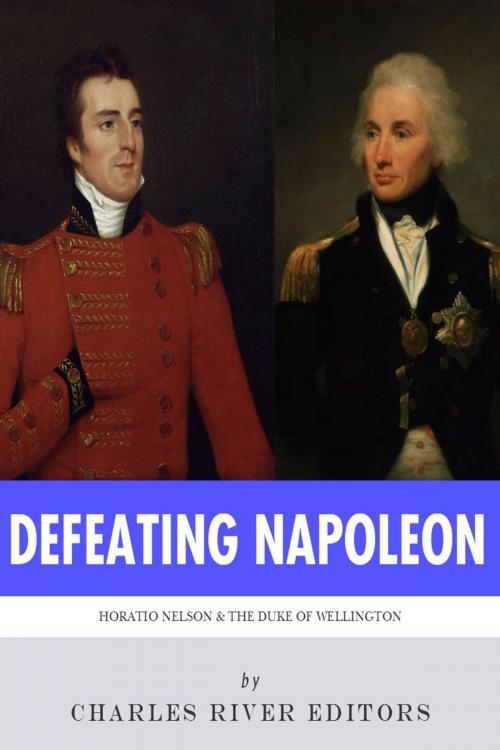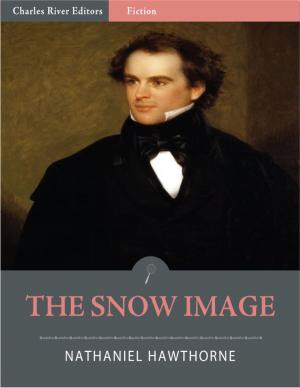Defeating Napoleon: The Lives and Legacies of Admiral Horatio Nelson and Arthur Wellesley, Duke of Wellington
Nonfiction, History, France, British, Biography & Memoir, Historical| Author: | Charles River Editors | ISBN: | 9781475318890 |
| Publisher: | Charles River Editors | Publication: | October 29, 2012 |
| Imprint: | Language: | English |
| Author: | Charles River Editors |
| ISBN: | 9781475318890 |
| Publisher: | Charles River Editors |
| Publication: | October 29, 2012 |
| Imprint: | |
| Language: | English |
*Weaves the lives of Nelson and Wellington together in one entertaining and educational narrative.*Includes pictures of Nelson, Wellington, and important people, places, and events in their lives.*Includes Bibliographies on each man for further reading.*Includes a Table of Contents.Over the course of its history, England has engaged in an uncountable number of battles, but none of her military heroes left a greater military legacy than Admiral Lord Horatio Nelson or Arthur Wellesley, the Duke of Wellington. While Napoleon spent nearly 15 years running roughshod over Europe, stunningly conquering nearly every field army put in his path, Nelson and Wellington were there to spoil his plans and put a permanent end to them. Napoleon enjoyed a stunning series of successes on the European continent, but Nelson frustrated his Egyptian campaign at the Battle of the Nile and ended his dream of invading Britain at Trafalgar in 1815. And while Napoleon dealt with the Prussians and Russians in the east, it was Wellington who held his ground and eventually ejected the French from the Iberian Peninsula before sending Napoleon on his way to St. Helena with Waterloo.Nelson is well known across the world for his decisive victory at Trafalgar, made all the more legendary by the fact that he was mortally wounded at the height of his greatest feat. And it is understandable that any man who could thwart Napoleons ambitions as well as Nelson did would earn a place in the history books. But Nelson embodied every virtue of his homeland; a dashing, courageous military officer who was impeccably cultured, and, of course, the best at what he did. Indeed, as the personification of the supremacy of the Royal Navy, the man and his life had a powerful resonance well before his death.In September 1852, a steam train carried the body of Arthur Wellesley, First Duke of Wellington, from Kent to London, where he was to be interred at St. Pauls Cathedral after a huge state funeral. A million would flock to pay their final respects, and young Queen Victoria wept openly, lamenting that his loss will be quite irreparable. By the time of his death, Wellington had been prime minister twice, a shrewd personal advisor to four British monarchs and one of the nations most prominent politicians for three decades. But despite his nearly four decades of peacetime service in and out of politics, Wellington has remained one of the titans of the 19th century because of one June day in 1815. Then, as now, the Duke of Wellington is best remembered for defeating Napoleon in the most famous battle of modern history at Waterloo. Even then, the fact Wellington is remembered for Waterloo belies his extraordinary military career, which saw him come up through fighting in the Netherlands and India before opposing Napoleons forces on the Iberian Peninsula for several years. By the time Wellington took command of allied forces during the Hundred Days Campaign and decisively finished the Napoleonic Era at Waterloo, he had participated in about 60 battles and was one of Britains greatest war heroes. Defeating Napoleon looks at the lives, careers and legacies of Britain's foremost military heroes, but it humanizes the charismatic, self-promoting Nelson and the stern, iron-willed Wellington. Along with pictures of important people, places, and events in his life, you will learn about Nelson and Wellington like you never have before, in no time at all.
*Weaves the lives of Nelson and Wellington together in one entertaining and educational narrative.*Includes pictures of Nelson, Wellington, and important people, places, and events in their lives.*Includes Bibliographies on each man for further reading.*Includes a Table of Contents.Over the course of its history, England has engaged in an uncountable number of battles, but none of her military heroes left a greater military legacy than Admiral Lord Horatio Nelson or Arthur Wellesley, the Duke of Wellington. While Napoleon spent nearly 15 years running roughshod over Europe, stunningly conquering nearly every field army put in his path, Nelson and Wellington were there to spoil his plans and put a permanent end to them. Napoleon enjoyed a stunning series of successes on the European continent, but Nelson frustrated his Egyptian campaign at the Battle of the Nile and ended his dream of invading Britain at Trafalgar in 1815. And while Napoleon dealt with the Prussians and Russians in the east, it was Wellington who held his ground and eventually ejected the French from the Iberian Peninsula before sending Napoleon on his way to St. Helena with Waterloo.Nelson is well known across the world for his decisive victory at Trafalgar, made all the more legendary by the fact that he was mortally wounded at the height of his greatest feat. And it is understandable that any man who could thwart Napoleons ambitions as well as Nelson did would earn a place in the history books. But Nelson embodied every virtue of his homeland; a dashing, courageous military officer who was impeccably cultured, and, of course, the best at what he did. Indeed, as the personification of the supremacy of the Royal Navy, the man and his life had a powerful resonance well before his death.In September 1852, a steam train carried the body of Arthur Wellesley, First Duke of Wellington, from Kent to London, where he was to be interred at St. Pauls Cathedral after a huge state funeral. A million would flock to pay their final respects, and young Queen Victoria wept openly, lamenting that his loss will be quite irreparable. By the time of his death, Wellington had been prime minister twice, a shrewd personal advisor to four British monarchs and one of the nations most prominent politicians for three decades. But despite his nearly four decades of peacetime service in and out of politics, Wellington has remained one of the titans of the 19th century because of one June day in 1815. Then, as now, the Duke of Wellington is best remembered for defeating Napoleon in the most famous battle of modern history at Waterloo. Even then, the fact Wellington is remembered for Waterloo belies his extraordinary military career, which saw him come up through fighting in the Netherlands and India before opposing Napoleons forces on the Iberian Peninsula for several years. By the time Wellington took command of allied forces during the Hundred Days Campaign and decisively finished the Napoleonic Era at Waterloo, he had participated in about 60 battles and was one of Britains greatest war heroes. Defeating Napoleon looks at the lives, careers and legacies of Britain's foremost military heroes, but it humanizes the charismatic, self-promoting Nelson and the stern, iron-willed Wellington. Along with pictures of important people, places, and events in his life, you will learn about Nelson and Wellington like you never have before, in no time at all.















